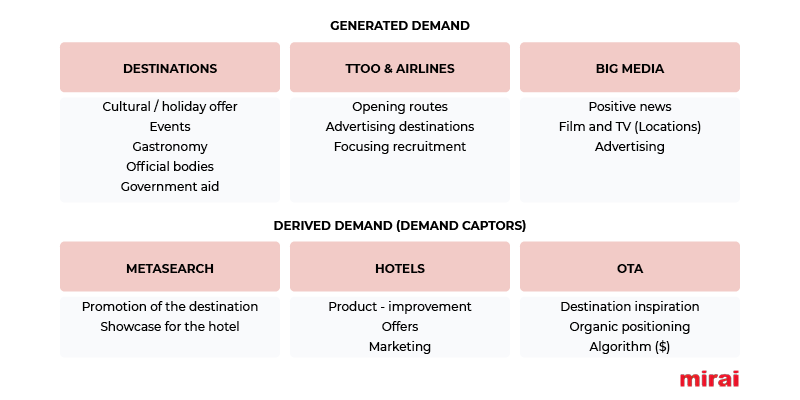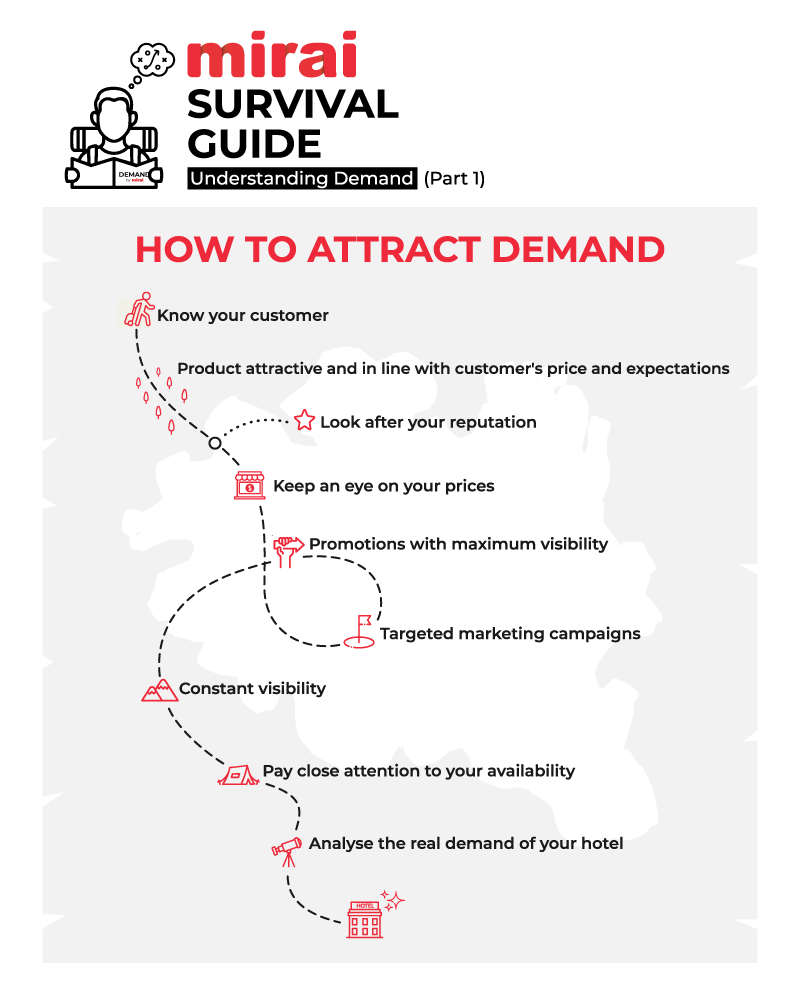En español, en français, em português.
Do OTAs generate demand? Can my hotel create demand if I close my eyes and clench my fists tightly?
In the following post, we will try to shed some light on the concept of demand, delving into how it works and how you can make use of it to benefit your establishment.
Generating Demand: Who is responsible?
Hotels do not generate demand by themselves. With this said, we could end the article here since this is the most important lesson you should take away from today. Only in very rare and exceptional cases (such as with the Ushuaia in Ibiza, which actually helps generate demand in the destination) does a hotel itself generate demand.
To understand what the hotelier’s radius of action is in relation to demand, let’s draw a line between the two sides. On the one hand, we have demand generation, where hotels have no influence, and on the other hand, we have demand “capture”, where the hotel competes with other channels and hotels to capture the generated demand. It is in this area that you should focus your strategy because this is where you can make a difference.

Demand generators
These are the main drivers of tourism demand and although they usually have a positive impact, they can also have the opposite effect. They can act on a stand-alone basis, or they can partner with other demand generators or demand aggregators. They can mainly be divided into:
-The Destinations
Tourist destinations are perhaps the most direct factor in demand generation. The cultural and holiday offerings, special events, gastronomy, and the initiatives of official bodies and governmental aid, play an essential role.
For example, the attraction of international events, such as music or sports festivals, can significantly increase visitor numbers at specific times of the year. The promotion of unique and high-quality culinary experiences also attracts specific tourists, who are looking for experiences that are more linear in time. The hotel and complementary offer are closely linked to the destinations and can be allied with them.
– Tour Operators and Airlines (and other transport)
Tour operators and airlines have a considerable impact on demand generation through the opening of new routes, advertising destinations and centralising bookings.
Airlines, by opening new connections, make it easier to reach destinations that were previously less accessible, which in turn can significantly transform tourism demand. Similarly, tour operators, by creating attractive and affordable packages, can channel large numbers of tourists to specific destinations.
Again, the hotel can ally itself with these demand generators and secure part of that share for itself.
– Big Media
Information in the media about a destination or advertising can be decisive when it comes to boosting visits to a place, and this is becoming increasingly important. It can have both a positive and a negative impact.
Here we are not only referring to the press, with television, cinema and social networks also acting as major generators of demand (screen tourism already moves around 100 million tourists a year, with a prime example being the Game of Thrones series in Spain). For Generation Z, social media has already overtaken Google in terms of looking for travel inspiration, with this trend continuing to grow day by day.
The good news? Social media is perhaps the most accessible demand generator for establishments and its organic model is one of the most affordable as well.
Generated Demand vs Derived Demand
Generated demand comes from the actors mentioned in the previous point, while derived demand refers to how hotels and other entities in the sector capture and exploit this demand.
Here we are referring to channels and other accommodations that capture demand, with some serving as conduits (they would be the showcases that display the product to the end customer) while others are waiting to capitalise on that final sale. Who are you competing against?
– Metasearch
They play an important role in promoting destinations and act as a showcase for hotels. Through these platforms, hotels can increase their visibility and attract tourists who are already interested in visiting a particular destination. However, their ability to incentivise destinations on their own is limited.
– OTAs (Online Travel Agencies)
Online travel agencies, through their use of destination inspiration, organic positioning and algorithms, also capture some of the demand generated and direct it to their platforms.
These agencies have a strong power of attraction due to their ability to offer a wide range of end-customer options, competitive pricing and strong loyalty programmes. In addition, they help us to gain an online presence that we can then capitalise on directly (with the famous billboard effect).
They serve as a thermometer to assess changes in demand, as they channel a lot of sales, but it should not be forgotten that by themselves they have a very limited capacity to generate new demand, which means it is important to avoid relying on them too heavily.
Direct sales: How to attract demand effectively
Now that we have a better understanding of the scope of accommodation, let’s look at how hotels can capture demand:
- Know your customer: it may seem logical, but you need to have a perfect understanding of who you are targeting, and which channels will reach them most effectively.
- Make sure your product is attractive and in line with the customer’s price and expectations: this will help you capture demand over other competitors in your market.
- Look after your reputation: nowadays it is essential to take good care of your online reputation, listen to your customers and interact with them by responding to their reviews, both positive and negative. Remember that social media is generating more and more demand, and you have to play this card to your advantage.
- Keep an eye on your prices: they should be aligned with the product and the marketplace. Most importantly, they must be competitive in the direct channel, so that you can drive demand for your hotel through direct channels and away from others with higher intermediary costs.
- Promotions: offers can help you attract customers at certain times, provided you give them maximum visibility.
- Targeted marketing campaigns: they can boost the visibility of the actions you launch, especially in tactical campaigns such as Black Friday.
- Constant visibility: for the customer to find you, you have to be there. Especially in those spaces where you compete head-to-head with other channels, such as metasearch engines.
- Pay close attention to your availability. Fully booked? Of course, but try to get the best price. Your demand may suffer a considerable drop if you fill too early at low prices.
- Analyse the real demand of your hotel so as to plan the prior actions and achieve the best results.
Conclusion
Hotels do not generate demand. Or, to put it another way, accommodation establishments must plan their distribution strategy based on existing demand until they can generate more demand on their own. With this in mind, you need to target your strategy well and capture the highest volume of those who will come. That doesn’t mean you can’t do anything to increase your direct sales, you can still compete for existing demand and above all capitalise on the higher volume of real demand for your hotel. How to do so? What is the real demand for my hotel and how does it differ from what we have just read? We will explain this in detail in Part 2. Stay tuned!
About Mirai Consulting
Our consultancy and support service for hotels looking to take their distribution and direct sales to the next level. More information at consulting@mirai.com




